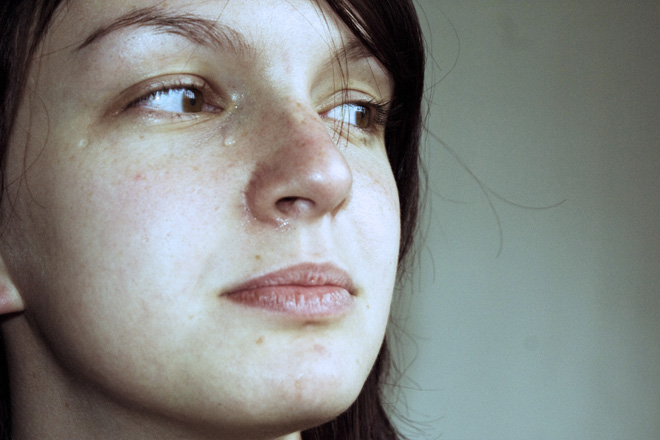|
When talking to bereaved people, the most common questions I am asked are about what is normal. So I hear questions like, "Is this normal? " or, "Am I normal? " or even, "Am I going mad? " The answer to these questions is usually, "yes, " "yes," and "no. "
We don't often talk about grief, and what it is really like. In the media and television, it's portrayed as a short time limited event. People are often seen wailing with grief one week, and then seemingly back to normal the next. And this can mirror real life, where people rally round in the aftermath of a death, and then will have seemingly forgotten in the months that follow. One question I am often asked is, Is it normal to still feel like this? The loss of someone close to us, is often a major life changing event. It's as though life has been turned upside down, inside out, and all over the place at the same time. The usual reaction is to go into a state of shock, where the person can feel detached, numb, on autopilot. This is the body's reaction to help prevent us from being overwhelmed by the loss. As this wears off, feelings such as sadness, anger, guilt, and anxiety become stronger. Consequently, most people feel worse in the 3 to 6 months following a bereavement, with the intensity of feelings tending to diminish over the next 12-18 months, as the person adjusts to the loss. Our actual experience of grief can often end up in conflict with our expectation of how we should be feeling. Commonly, people will say something like, I really should be back at work by now. My colleague lost her mother, and she was back at work the next day! What we don't see is our colleagues, and friends in their private moments when they are in a mess. We only see them when they've got their 'brave face on'. People often worry that when they go back to work, they will collapse in tears, however this rarely happens. Although I have suggested some time frames, the reality is that we all respond differently to a loss. Grief is an extremely individual thing, and rather than asking "Is it normal? " the question really should be "Is this normal for me? " For many people the experience of bereavement is so different to their other experiences, that this is a very difficult if not impossible question to answer. Generally, as a rough guide, the closer we are to the person who has died, the stronger and more intense the feelings of loss are, and the longer we may need to come to terms with what has happened. If the loss was unexpected, or traumatic then this can also mean the feelings may be more intense and we need longer. For some people however, they find that their grief is delayed. Sometimes, this is because there simply isn't enough space or time to be able to grieve, or it might be because the feelings are too painful to deal with at the time. They can then find themselves beginning the process of grieving several months, or years later. And, sometimes a later bereavement can bring up unfinished issues from earlier ones. One of the things about grief, is how it transforms what is normal. Feelings, thoughts, and experiences, which would be strange and troubling in everyday life, are all quite 'normal' when people are grieving. The mind and body is very finely tuned. People we are close to, are important in helping us maintain this tuning, and so losing them upsets this balance. We are able to think, feel, and do the things we do, because nervous impulses in the brain are very precisely timed. Disturb this timing, and it throws us off balance. For the majority of people these changes are temporary. However, people may also find the process of adjustment will lead them to develop new ways of doing things. When people are grieving, it is normal to...
Rather than questioning "Is it normal to feel like this? " to which the answer is "Where you are right now, yes, " a more useful question might be, Do I need some help, so I can cope better with what I am going through? You might want to consider seeking additional help, if you are feeling stuck, or are feeling overwhelmed, and finding you are not coping with day to day life. Grief can also contain unusual experiences
There are also some more unusual experiences that are commonly associated with grieving, which are not often spoken about. Perhaps, one of the most unusual experiences, is feeling the presence of the person who has died. In my experience helping bereaved people, about 1 in 4, have talked about this kind of experience.
The experience can take several forms. From a vague feeling that the person is still around; to feeling like the person is watching over those they left behind, and feeling that they were behind events that have happened; to feeling an animal has become the emodiment of the person who died. For some people this sense of presence can be more physical. Some people report a feeling that they were touched by the dead person; usually it's a light brushing sensation. A few people have seen the dead person as a brief shadowy form, usually out of the corner of their eye. Most people who have these kind of experiences find they get less frequent over time, and the majority of people will only have a small number of instances. In helping people who report these kind of experiences, the question of is this normal, can become "Am I going mad? " to which the answer is almost invariably, no. My approach is to explore with the person the meaning they get from these experiences. Many people derive a sense of comfort that their loved one is still in some sense around, and may also develop more spiritual explanations for these events. Personally, I believe the Universe is a very large place, and I rather like Shakespeare's view on this, There are more things in heaven and earth, Horatio,
If you prefer a more scientific explanation, a way of understanding these experiences, is to see them as similar to phantom limb pain - which is when following amputation the limb feels as though it is still there.
Living with someone for a lifetime builds up a pattern of connections within our brains. When that person dies, that pattern of connections has nothing to latch onto, and so is very receptive to anything that is reminiscent of the person who died. So, we suddenly 'see' them walking down the street, the phone rings and it's them, a bird flies into the garden and acts like they did. This explanation is just one way of understanding what is happening, it's not the only way of understanding. What's important is finding a meaning that fits with your beliefs, and helps to makes sense of your experience. Grief transforms what is normal
In looking at 'normal' grieving, I am struck by the way it transforms what is normal. This change in normal goes hand-in-hand with the reality of bereavement. The person who is loved is no longer here.
What was before, that was the old normal, this is the new normal. These new and strange feelings, thoughts, and experiences are how we find our way in this new normal. It takes time to return to a sense of balance again, and quite often we end up balancing in a slightly different place.
title image by mokra
0 Comments
Your comment will be posted after it is approved.
Leave a Reply. |
Categories
All
Archives
January 2021
|
BioI'm Mark, a Humanistic Counsellor. |
Home - Testimonials - Articles - Links - Contact - Book Appointment - Counselling Students - Privacy Policy - Terms
Mark Redwood, BA (Hons) Counselling, MBACP
© Mark Redwood 2015, 2016.2017 | Main portrait by Doug Freegard © 2015


 RSS Feed
RSS Feed